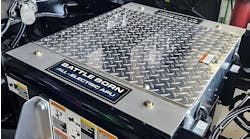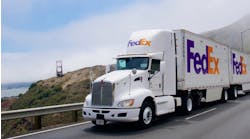International Truck & Engine Corp. is planning to adjust its marketing strategy in the face of trucking’s concerns about EPA ‘07-compliant engines and driver and technician shortages as well as the OEM’s own introduction of a proprietary heavy-duty diesel engine.
“Having our own 13-liter big bore engine is going to be a big help for starters,” John Fay, International’s marketing director-- heavy truck vehicle center, told Fleet Owner. “Our competition has their own engines and now having our own will help us better configure it to our trucks. It’ll also help us in terms of easing the engine allocation restrictions we’re under from Cummins and Caterpillar.”
He noted that as Volvo, Mack, and Freightliner have developed their own proprietary engines, it has driven some business to International. But now Fay said the company needs its own engine to have a fuller product offering. “We currently have a 15-liter engine offering from our suppliers – having our own in-house 13-liter option is going to be great,” Fay remarked.
Building its own heavy-duty engines will also ease the OEM’s transition to tighter emission controls in 2007, Fay added, giving its customers more confidence in the newer engine technology.
“We hope this will help us calm down the ’07 situation,” he said. “The big issue right now is price, but it’s not going to be as bad as everyone expects. We’ve wrapped up ’07 winter testing and over the next six months we’re going to put eight ’07-ready trucks in customer fleets for more testing.”
Mike Frasure, International’s marketing manager for private carrier/leasing segments, said that changes in the maintenance and driver needs of fleets will also spur a change in the OEM’s marketing strategy.
“Fleet maintenance patterns are changing,” he told Fleet Owner. “Private fleets especially are now buying extended warranties for their trucks, performing their own preventive maintenance (oil and fluid changes, etc.) in house, while letting dealers handle any big repairs. This reflects the impact of the technician shortage coupled with fleet desires to have some control of the maintenance end.”
Addressing driver needs are becoming a greater focus too, especially in automatic transmissions for over-the-road tractors. “The automatic transmission is going to be a staple of the Class 8 market, whether it’s sooner or later,” explained Fay. “The reasons are simple: backing up, turning, negotiating city traffic are all high-stress safety situations. The streets are only going to get more congested in the future. Plus, automatics make driving easier and less tiring for the driver.”
Fay noted the single biggest hurdle to the wider adoption of automatics in Class 8 trucks is initial cost. He said even driver resistance isn't as big a factor as cost. “But I believe that cost is going to really come down and the fuel savings from better shift management will also push the adoption of automatics by fleets,” he added.



